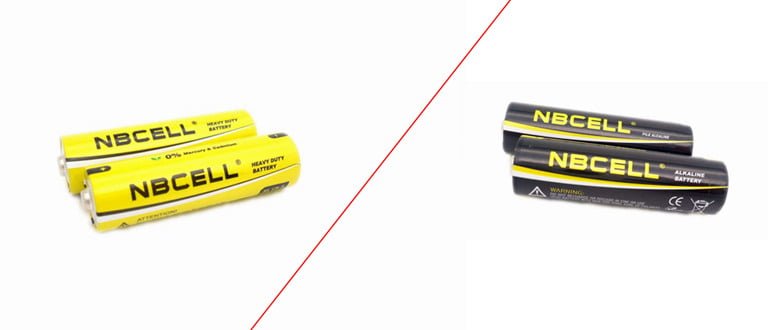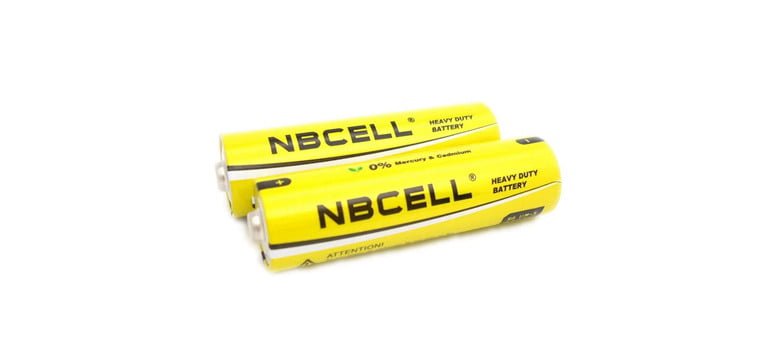When it comes to powering our favorite gadgets and devices, batteries are essential. Both carbon-zinc batteries and alkaline batteries are the most common disposable batteries in our lives, and their sizes are basically the same. So, when faced with carbon-zinc and alkaline batteries, which one is the better choice?
The answer is simple: carbon-zinc batteries have lower capacity and discharge current, suitable for low-power devices like remote controls and clocks; alkaline batteries have higher capacity and discharge current, suitable for high-power devices like digital cameras and electric toys. Carbon-zinc batteries are affordable but have a short shelf life and are more prone to leakage. Alkaline batteries are slightly more expensive but have a longer shelf life, are less likely to leak, and are more environmentally friendly than carbon-zinc batteries. For devices that can use both types of batteries, alkaline batteries provide longer usage time and more abundant power. You can choose the most suitable battery according to your needs.
Now let’s delve into carbon-zinc batteries and alkaline batteries in more detail!
Carbon Zinc vs. Alkaline Batteries

Types of Batteries - Carbon Zinc and Alkaline
Carbon-zinc batteries, sometimes referred to as heavy-duty batteries or dry batteries, consist of a zinc anode, a carbon cathode, and an electrolyte paste that facilitates the chemical reactions necessary for generating electricity.
Alkaline batteries use a manganese dioxide cathode and a zinc anode, with potassium hydroxide serving as the electrolyte. The alkaline electrolyte enables more efficient chemical reactions, resulting in higher power output.
Differences between carbon zinc and alkaline batteries
Energy Density:
Compared to carbon-zinc batteries, alkaline batteries have a higher energy density, meaning they can provide more power for a longer period. This makes them suitable for devices that require continuous high power, such as digital cameras and electric toys. Carbon-zinc batteries, with their lower energy density, are better suited for low-power devices like remote controls and clocks.
Price:
Carbon-zinc batteries are typically cheaper than alkaline batteries, making them the preferred choice for low-power devices when on a tight budget. While alkaline batteries are slightly more expensive, they offer significantly higher energy capacity for the same specifications, making them very cost-effective. If you prefer not to frequently replace batteries during tool usage or entertainment activities, alkaline batteries are the better choice.
Shelf Life:
Compared to alkaline batteries, carbon-zinc batteries often have a shorter shelf life. Additionally, carbon-zinc batteries are more prone to leakage during long-term storage. This is an important factor to consider if you prefer buying batteries in bulk or don’t use batteries frequently.

Can I use alkaline batteries instead of carbon zinc?
A common question that arises is whether alkaline batteries can be used as substitutes for carbon-zinc batteries. In most cases, the answer is yes. Alkaline batteries can typically replace carbon-zinc batteries without any issues. However, it’s crucial to check the specifications of the device to ensure it can handle the higher voltage output of alkaline batteries.
In some instances, using alkaline batteries in devices specifically designed for carbon-zinc batteries may lead to reduced battery life or even damage to the device. If you’re unsure, it’s best to consult the device’s user manual or contact the manufacturer for guidance.
How to Differentiate Between Alkaline and Carbon-Zinc Batteries?
At first glance, alkaline batteries and carbon-zinc batteries look very similar in size and appearance. So much so that when purchasing, we often opt for the cheaper option based on size—carbon-zinc batteries. However, we might find them draining quickly once in use.
To distinguish between the two, we can look at the product labeling and weight. Alkaline batteries are typically labeled with “LR” in their category designation, such as “LR6” for AA alkaline batteries and “LR03” for AAA alkaline batteries. They may also have “ALKALINE BATTERY” printed on them. Carbon-zinc batteries are usually labeled with just “R,” without the “L.” Carbon-zinc batteries may be labeled as carbon-zinc or heavy-duty batteries.
Even batteries of the same size, alkaline batteries tend to weigh more than carbon-zinc batteries.
